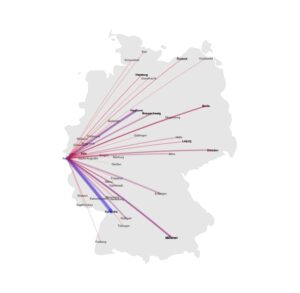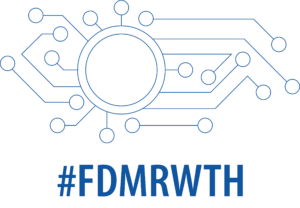In this article, we would like to inform you about the recently published Funding Atlas of the German Research Foundation (DFG) and the key figures on publicly funded research in Germany. Published only every three years, this report is considered and serves as a “long-term observation of the German research landscape.” In this latest edition, the most recent decisions in the National Research Data Infrastructure (NFDI) program also receive accentuated consideration, and with it the role of RWTH Aachen University.
National Research Data Infrastructure (NFDI) funding focus
A major leap towards digital sustainability is to be achieved with the NFDI, and in terms of its national importance, it is to take on even greater significance in the coming years. Thus, the Joint Science Conference (GWK) is funding the development and promotion of the NFDI until 2028. This means that the NFDI will provide a sustainable response to the digital transformation. The national research data infrastructure is to be further expanded and established from year to year. In a total of three rounds, research data management will be established by the NFDI. Currently, two rounds of NFDI bidding have been completed. With a final expansion of about 30 infrastructural institutions, also called consortia, the expansion of the research data infrastructure should be completed.
The aim of the National Research Data Infrastructure is to sustainably secure, systematically access and make available data from research and science. With the help of the DFG’s funding and support for the consortia, further important steps towards realizing these goals can be taken. The potential of the National Research Data Infrastructure was recognized in the recently published coalition agreement and the NFDI and its future development were explicitly mentioned.
The role of RWTH Aachen University
With seven NFDI projects as an applicant or co-applicant in the first two rounds of calls, RWTH Aachen University has a top national position. For example, besides RWTH, only two other institutions in Germany, the Karlsruhe Institute of Technology (KIT) and the Technical University of Munich (TUM), are so extensively involved in the NFDI.
The extent to which RWTH Aachen University is involved in the National Research Data Infrastructure and in its consortia can be seen in the figure above: for example, RWTH Aachen University is considered an important and active node of the NFDI, with a large number of scientific institutions participating in the consortia, and is excellently represented in collaborative relationships with other institutions. After two out of three rounds of calls, the role of RWTH Aachen University in terms of its national importance and collaborations has been clarified and recognized by the DFG. Non-university institutions such as the FZ Jülich and the FIZ Karlsruhe – Leibniz Institute for Information Infrastructure – are also considered to be NFDI hubs.
It will be exciting to see how the third round of calls will turn out for RWTH Aachen University and how data-driven research will continue to be shaped and funded. Stay tuned – we will update you shortly on the timeline for the decision process for funding basic services in the National Research Data Infrastructure.
In our past blog posts, you will find the compiled events on the last two rounds of calls, get insights on the third round as well as on the funded consortia:
- Glückwunsch! Förderung von acht NFDI-Konsortien mit RWTH-Beteiligung (Congratulations! Funding of eight NFDI consortia with RWTH participation)
- NFDI Förderung: Die Dritte Ausschreibungsrunde (NFDI funding: the third round of calls for proposals)
- NFDI-Förderung der Konsortien NFDI4Ing, NFDI4Chem und NFDI4Cat (NFDI funding of the consortia NFDI4Ing, NFDI4Chem and NFDI4Cat)
Learn more
For questions about funding and NFDI in general, feel free to write to the ServiceDesk. The FDM team looks forward to hearing from you.
For more information on FDM, also visit the RWTH web pages.
______
Responsible for the content of this article Lina-Louise Kaulbach.






Leave a Reply
You must be logged in to post a comment.